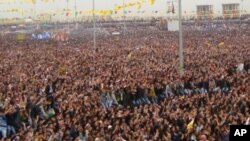Hundreds of thousands of Turkey's minority Kurds have been celebrating Newroz - the start of the Kurdish New Year. The celebrations are the most important event of the Kurds' cultural calendar, but as in previous years, many of the festivities were marred by violence. The clashes come as Turkey's main Kurdish party accuses the ruling AK Party of being behind an ongoing legal crackdown on its members before this June's general election.
For nearly a week, celebrations of Newroz, the Kurdish New Year, have been held by Kurds throughout Turkey. The festivities are marked by music, dancing and jumping across fires to signify the passing of the year, and culminate on March 21.
On Sunday in Istanbul, hundreds of thousands of Kurds celebrated in a powerful show of force for the country's main pro-Kurdish party, the BDP, before this June's general election. Addressing the crowd, BDP leader Selahattin Demirtas says the polls are of crucial importance.
Demirtaş declares the government must behave more responsibly. He says the government is worried about the number of seats the BDP will take from them. The 2011 general elections carry historic importance for the Kurdish people.
Observers say the large turnout for the Newroz celebration is an indication of a rejuvenation in the fortunes of the pro-Kurdish party. In the last couple of years, the party has inflicted a heavy electoral defeat on the ruling AK Party. The Kurdish vote is seen as crucial to Prime Minister Recep Tayyip Erdogan's goal of securing a two-thirds parliamentary majority, which he needs for his key aim of rewriting the constitution.
The increasing rivalry has been matched by growing tensions in Turkey's predominantly Kurdish southeast.
Newroz celebrations throughout the region on Sunday were marred by clashes with the security forces. Some of the worst confrontations occurred in the region's largest city, Diyarbakir. The clashes occurred at the end of the celebrations, which organizers claimed drew more than 500,000 people.
Scores of arrests were made, with police using tear gas and rubber bullets. Emma Sinclair Webb of the rights group, Human Rights Watch, says security forces are taking an increasingly tough stance against peaceful protestors.
"You have civilian demonstrators, ordinary people who go on the streets to protest who end up by their mere presence at the demonstration with sentences that suggest they (are) in fact armed militants," Webb said.
Earlier this month, five Kurdish students received prison sentences of 57 years in total for boycotting classes in protest of the police shooting of two fellow students. The students were convicted of committing a crime on behalf of the banned Kurdish rebel group, the PKK, which has been fighting the Turkish state for greater Kurdish rights since 1984.
Similar anti-terror legislation is being used in an ongoing crackdown on BDP members, in which 1,600 people have been jailed and arrested. BDP leaders claim the crackdown is politically motivated to weaken the party before the June election.
But the government dismisses the charge, saying the judiciary is independent and the charges are for allegedly channeling funds from municipalities to terrorist organizations and are not politically motivated.
But the European Union, which Turkey is seeking to join, in its annual report about the country, raised concerns about the legal crackdown. Richard Howitt is a member of the European Parliament Committee on Turkey and has been closely following the cases.
"For 1,600 people to be arrested, 150 people to be prosecuted, with I [am] told 7,500 pages on the indictment list, but not one mention of any weapon or any violence seems to suggest its series of political trials against Kurdish activists, that what they say [is] maybe true," he said.
But political columnist Nuray Mert says the crackdown on BDP plays well with Turkish nationalist voters and with a general election approaching, she expects Prime Minister Recep Tayyip Erdogan only to harden his stance against the pro-Kurdish party.
"Erdogan will again take tough measures to please nationalist electorates and [he] majority of Turkish people, and again prove his case by saying that [the] PKK is a terrorist organization and [the] BDP is a sheer tool of this organization," Mert said.
Observers say the Newroz celebrations were a powerful opening to the BDP’s electoral campaign. But the violence that accompanied them is also being seen as a sign of rising political tensions, which are only expected to increase as the general election approaches.
Turkey's Kurds Mark New Year as Nationalists Launch Push for Minority Rights




